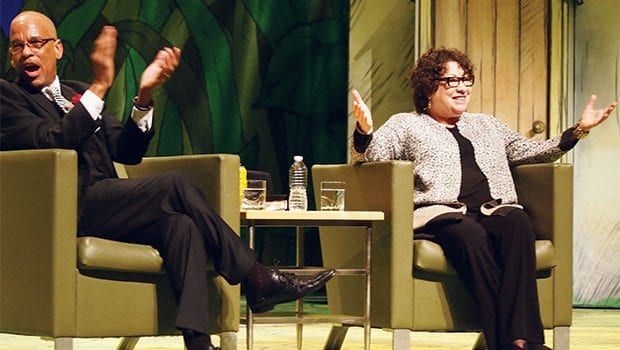
U.S. Supreme Court Associate Justice Sonia Sotomayor spent much of last Saturday meeting with luminaries in Boston’s Puerto Rican community, touring the Villa Victoria public housing development and hosting a luncheon with Latino community members before giving an address at Wheelock College.
The meetings and community tour, during which she met with residents of this historically Puerto Rican development, are part of a practice Sotomayor says helps her connect her work on the Supreme Court to the everyday realities of the people who are affected by the decisions she and the other justices make from the bench.
“We talk about the consequences but we don’t live them,” she said. “We have something most people don’t have. We have jobs for life.”
While Sotomayor refused to answer a question about rulings the court may make on Puerto Rico’s debt crisis, she did underscore the importance the decisions will have on the lives of the people on the island.

U.S. Supreme Court Associate Justice Sonia Sotomayor speaks at Wheelock College, sharing the dias with Con Salsa host Jose Masso.
“I pray that the decision makers understand that this is about more than just money,” she said. “This is about people and their lives.”
Puerto Rican government officials argued in March before Sotomayor and her seven colleagues that the island should be able to restructure its $70 billion debt. The government of Puerto Rico last week missed a $422 million debt payment, while struggling to keep basic government functions running.
Sotomayor recently visited the island and said that government employees and teachers there are particularly vulnerable.
“The Puerto Rican people are scared,” she said. “There are a lot of people whose lives will be deeply, deeply affected by what goes on there.”
Sotomayor, whose parents were from Puerto Rico, grew up in a working class family. She said neither she nor her mother ever imagined she would ascend to the highest U.S. court.
“My actual work, it doesn’t really matter to her,” she said. “It mattered to her that my brother and I got an education. I’m from a generation whose parent came here wanting a better life.”
Sotomayor contrasted her life, with that of Lin-Manuel Miranda, whose award-winning musical “Hamilton” has taken Broadway by storm. Miranda’s accomplishment underscores the progress Puerto Ricans have made in the U.S., she said.
“He’s been given a freedom that I don’t think my parents would understand,” she said. “He’s been given the freedom to be creative.”
During her Boston trip Sotomayor met with prominent Puerto Rican activists who were honored as part of Hunter College Center for Puerto Rican Studies 100 Puerto Ricans list: Jaime Rodriguez, Jovita Fontanez, Felix D. Arroyo, Tony Molina, Jose Masso, Felita Oyola, Miguel Fuentes and Ernesto Gonzalez.
At the Villa Victoria, Sotomayor toured the development and spoke with residents, said Vanessa Calderon Rosado, executive director of Inquilinos Boricuas en Accion, the community development corporation that owns and maintains the development.
“She talked about community, the value of family,” Calderon-Rosado said of the meeting, which was closed to the press. “The residents were so happy to have her visit. She was so humble and so human.”
In her address at Wheelock College, Sotomayor said she particularly enjoyed meeting with the senior citizens in the Villa Victoria development.
“They were my grandmothers and aunts,” she said. “Being with them keeps me real. If I ever lose that, I tell my friends, take that big fat book I wrote and hit me over the head with it.”
Among those who met with Sotomayor was William Rodriguez, assistant professor and chair of Juvenile Justice and Youth Advocacy at Wheelock College, who like Sotomayor, grew up in the Bronx in the 1960s.
“She told me it’s really great to see another survivor of that era in the Bronx,” Rodriguez said. “Many of the people we know ended up dead or in jail. For her to make it to the highest court in the nation as a Puerto Rican woman — that resonates for me.”
Following her Wheelock speech, Sotomayor took questions from audience members, walking through the aisles of the college’s auditorium. When a first-year law school student asked for advice on how to get through her studies, Sotomayor advised her to seek help from fellow students.
“There’s nothing natural about law school,” she told the student. “Lawyers don’t think like normal people. They teach you to think objectively in a way that’s logical to them, but it’s not normal to the rest of us. Please understand that you’re not stupid.”
Sotomayor hugged the questioners and posed for photos with each.
Questioned about the negative tone in the presidential race, Sotomayor urged the audience to remain positive.
“If we let the tone of some of the public discourse that’s happening now become the standard in America, then we’ve lost America,” she said.







